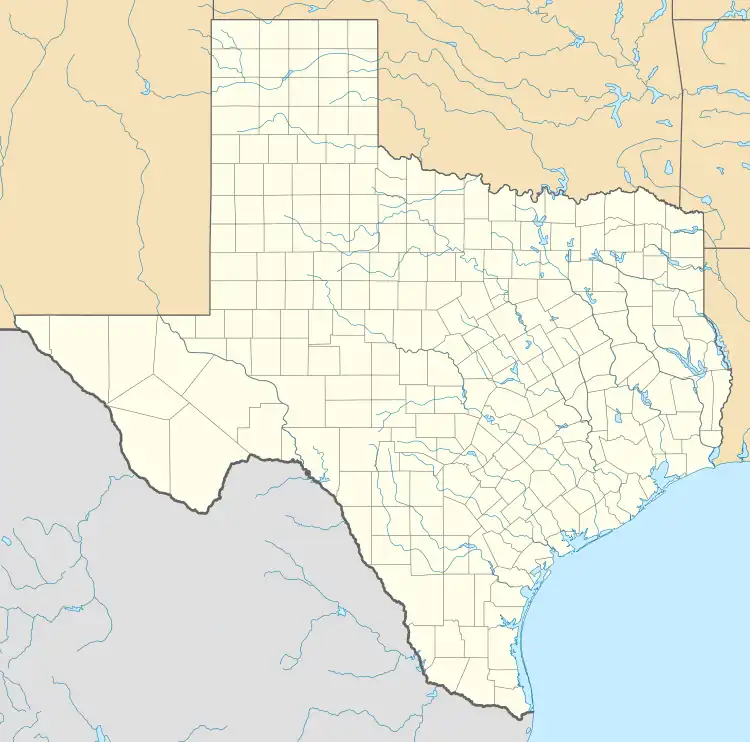Germany, Texas | |
|---|---|
 Germany  Germany | |
| Coordinates: 31°26′25.2378″N 95°21′3.0954″W / 31.440343833°N 95.350859833°W | |
| Country | United States |
| State | Texas |
| County | Houston County |
| Population (2000) | |
| • Total | 43 |
| Time zone | UTC−06:00 (CST) |
| • Summer (DST) | UTC−05:00 (CDT) |
| Zip code | 75835 |
Germany is an community in Houston County, Texas, United States.[1] According to the Handbook of Texas, the community had a population of 43 in 2000.
History
One of the area's first immigrants, Jacob Masters Sr., arrived here with his family and slaves around 1828 via North Carolina, Kentucky, and Alabama. Through empresario David G. Burnet, Masters and his son Jacob, Jr. submitted a request for land on October 30, 1834, and on February 14, 1835, the Mexican state of Coahuila y Tejas granted each of them a league of land. Joseph Rice, the son-in-law of Masters, acquired land in the county on December 30, 1841, and he erected a house close to Old San Antonio Road. The house of Joseph and Willie (Masters) Rice was renamed the Rice Stagecoach Inn. Thomas Jesse Duren and his family and slaves moved to the area in the late 1830s or early 1840s. According to legend, the slaves from this region gathered in 1865 at the ancient Cermark homestead site, about a quarter mile from the current Germany Road, to hear the Emancipation Proclamation read. The freedmen's mentions of a German family by the name of Grounds—also written Grunt, Gront, Grount, Grundt, or Groundt—who had settled in the region between 1829 and 1833 are thought to be the source of the community's name, Germany. There is still a cemetery nearby called The Grounds. On December 21, 1871, John Burt reportedly became the first freedman to settle in Germany. He filed on a 160 acres (65 ha) preemption plot on San Pedro Bayou on June 15, 1876, and on January 3, 1877, he was granted a patent for the property. Crockett is about ten miles to the northeast of the preemption tract. In 1872, two freedmen established their occupancy: Lewis Hall on June 7 (patent received on May 28, 1883) and George Smith on January 25 (patent received on May 29, 1876). Van Benton, a different freedman, demonstrated his occupancy on January 1, 1875, but he died before his patent was approved. His widow Jane Benton wed John Burt in 1882, and the two of them rose to prominence in this Black settlement. Around 1883, they gave property for a church building and a cemetery. Later, the New Pleasant Hill Baptist Church had several relocations. The initial church site is just in front of the old Germany Cemetery. Germany lacked a post office and other types of enterprises, but in the early 1930s George W. Allen built and operated a candy shop out of a two-story wooden structure behind the church. Houston County's 1930s oil finds had no noticeable economic effects on the area. On a few local properties, oil had been discovered by the 1940s, but the wells had been sealed off. Some landowners started negotiating oil, gas, and mineral leases with oil firms in the 1950s. The main source of income for the Germany community has always been agriculture. The families grew corn and other garden crops for their own consumption, as well as cotton for the market. At least fifteen close-knit Black families were living in the Germany community, and most of them intermarried. It started to dwindle during World War II as young men enlisted, and Crockett High School graduates moved to big cities. Germany had less than six families at the beginning of the 1990s. The population was 43 in 2000. Some community members' descendants travel from Houston and other cities to attend services at the Baptist church. The families go to the Berryman Reunion in July, the Community Reunion in June, and the Church Homecoming in September every year.[2]
The town is most notable for its name, which is shared with the country of Germany.
Geography
Germany is located on Texas State Highway 21 on the Old San Antonio Road, 10 mi (16 km) northeast of Crockett in east-central Houston County.[2]
Education
The community's first school was built in 1883. The church structure served as the site of Germany's first Black school. There was also a rural White school in the area with various names including Energy, Enterprise, and Glover; the Black school adopted a variation of the same name, like Glover Colored School. Alonzo and Jennie Berryman sold land to Houston County Common School District No. 22 on October 21, 1921, to build the area's first official Black school. The Julius Rosenwald Fund reportedly provided funding for the structure; Rosenwald's assistance contributed to the construction of at least twenty schools in Houston County. The Germany School was shut down and its building was sold in the early 1950s.[2] Today, the community is served by the Latexo Independent School District.
References
- ↑ U.S. Geological Survey Geographic Names Information System: Germany, Texas
- 1 2 3 "Germany, TX". The Handbook of Texas. Texas State Historical Association. Retrieved October 29, 2013.
